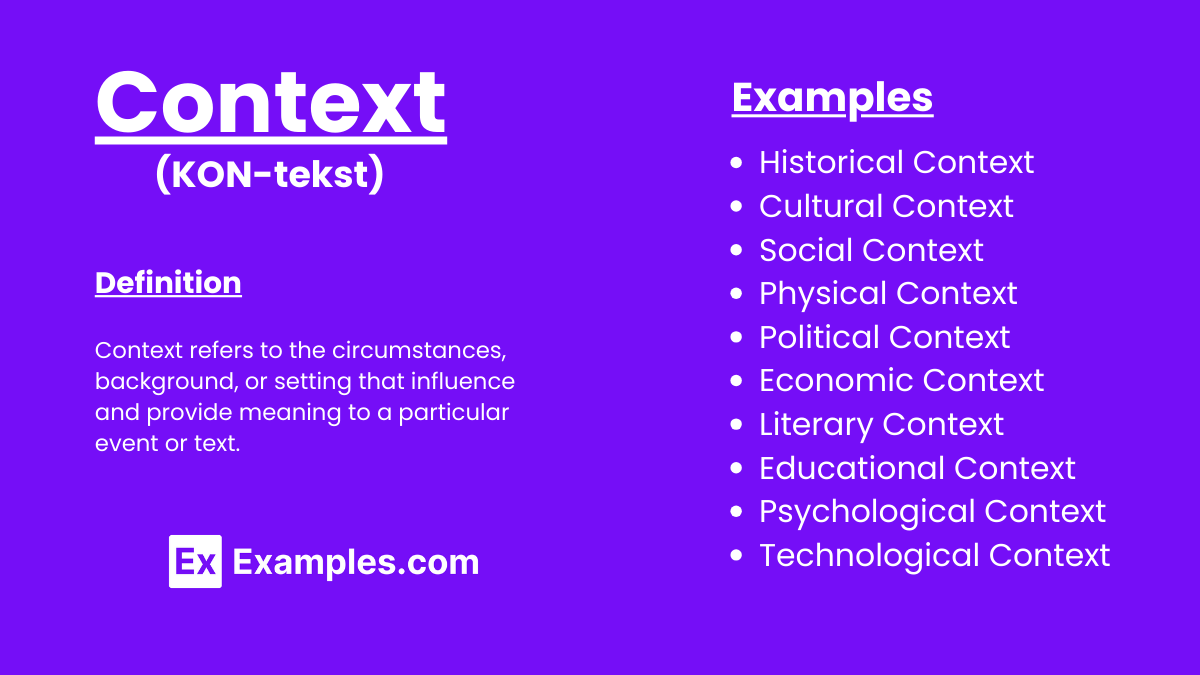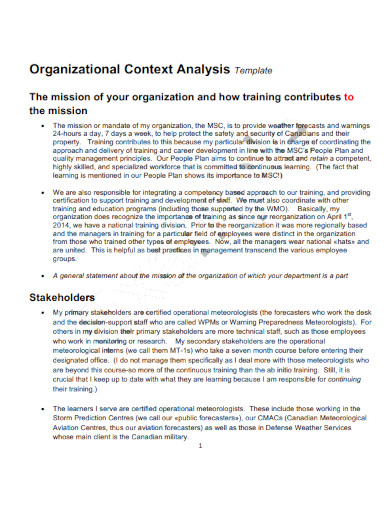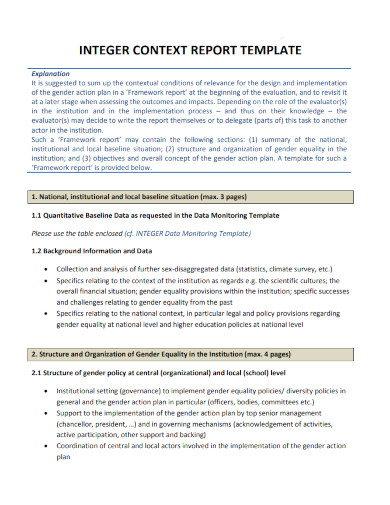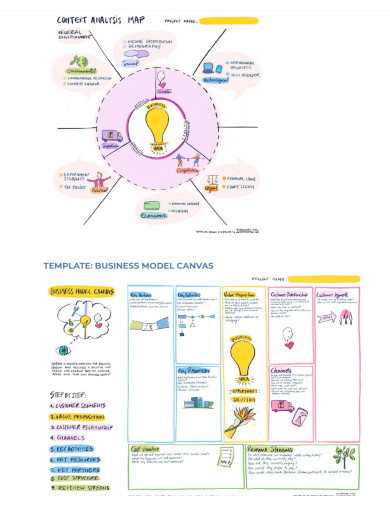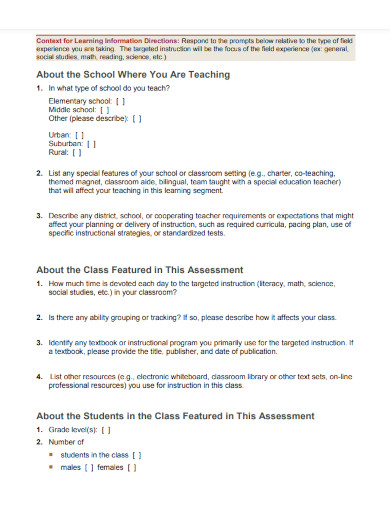75+ Context Examples
As humans, we unconsciously process a lot of background information to glean insight and understanding. One of the ways we do this is through our absorption of information through our senses with the utilization of context and context clues.
What Is Context?
Context is the underlying circumstances that will lead to the formation or formulation of a specific idea, action, attitude, and behavior. People use context to have a more deep and clear understanding of a specific situation, action, idea, concept, or word.
Context Examples
1. Educational Context:
- Example: In a history classroom, teachers might use primary source documents to provide context for significant events like the American Revolution, helping students understand the historical background and perspectives of that era.
2. Medical Context:
- Example: A doctor explains the context of a patient’s symptoms by considering their medical history, lifestyle, and recent activities, leading to a more accurate diagnosis and treatment plan.
3. Business Context:
- Example: When launching a new product, a company analyzes market context, including competitor offerings, customer needs, and economic conditions, to develop a successful marketing strategy.
4. Literary Context:
- Example: Understanding the social and political context of George Orwell’s time enhances the interpretation of his novel “1984,” revealing deeper insights into its themes of totalitarianism and surveillance.
5. Social Context:
- Example: Social behaviors, such as greeting customs, vary widely across cultures. In Japan, bowing is a common greeting, while in the United States, a handshake is more typical.
6. Environmental Context:
- Example: Conservation efforts must consider the environmental context, such as local climate, species diversity, and ecosystem health, to develop effective preservation strategies.
7. Technological Context:
- Example: The development of smartphones revolutionized communication by providing context-aware services like GPS navigation, real-time traffic updates, and personalized recommendations.
8. Legal Context:
- Example: In legal cases, understanding the context of laws and precedents is crucial for interpreting statutes and making arguments. For instance, the context of a law’s passage can influence its application in court.
9. Cultural Context:
- Example: In advertising, understanding cultural context is vital. A campaign that resonates in one country may not be effective in another due to different cultural norms and values.
10. Psychological Context:
- Example: A therapist considers the context of a patient’s life experiences, relationships, and mental health history when developing a treatment plan to ensure it addresses the root causes of their issues.
1. Organizational Context Analysis Template
2. Integer Context Report Template
3. Context Analysis Map Template
4. Context for Learning Information Template
5. Context Menu Template
Context Sentence Examples
- She finally understood the meaning of the word when she saw it used in context.
- In the context of the meeting, his comment made perfect sense.
- The data needs to be interpreted within the context of the current economic climate.
- Her actions seemed strange out of context, but they were actually quite reasonable.
- He provided background information to give the speech more context.
- When viewed in the context of her entire career, this mistake was a minor one.
- Understanding the historical context of the novel helps readers grasp its themes.
- The artist’s work is best appreciated in the context of her life experiences.
- Political speeches often make more sense when you consider the context in which they were delivered.
- The teacher explained the context of the poem to help students understand its deeper meaning.
Context Examples in Communication
- During the negotiation, understanding the cultural context of the other party was crucial to reaching an agreement.
- The context of the email suggested that the deadline was flexible.
- In the context of a job interview, it’s important to highlight your relevant experience.
- His joke was inappropriate given the somber context of the meeting.
- The context of the conversation indicated that she was looking for advice, not just sympathy.
- Without the context of the previous discussions, his statement seemed out of place.
- In the context of public speaking, knowing your audience is key.
- The context in which she made the comment made it clear she was joking.
- Context clues in the conversation helped her understand the technical jargon.
- In a multicultural team, understanding the context of different communication styles is essential.
Context Examples in Literature
- In “To Kill a Mockingbird,” the racial tensions of the American South provide critical context for the story.
- The dystopian context of “1984” enhances the novel’s themes of surveillance and control.
- In “The Great Gatsby,” the context of the Roaring Twenties is essential for understanding the characters’ lifestyles.
- The medieval context of “The Canterbury Tales” adds depth to its diverse characters and stories.
- Understanding the context of the Russian Revolution helps readers grasp the allegory in “Animal Farm.”
- The context of the Great Depression in “Of Mice and Men” shapes the characters’ struggles and dreams.
- In “Pride and Prejudice,” the social context of Regency England influences the characters’ actions and relationships.
- The historical context of the Vietnam War is crucial for understanding the themes in “The Things They Carried.”
- “Frankenstein” is enriched by its context in the Romantic era, with its emphasis on nature and emotion.
- The context of colonial India in “A Passage to India” highlights the cultural and racial tensions of the time.
Historical Context Examples
- The Civil Rights Movement: Understanding the struggle for racial equality in the 1960s provides context for Martin Luther King Jr.’s speeches.
- The Industrial Revolution: The shift from agrarian societies to industrialized ones in the 18th and 19th centuries shapes the backdrop of Charles Dickens’ novels.
- World War II: The global conflict and its aftermath offer context for Anne Frank’s diary.
- The Cold War: The political tension between the US and the Soviet Union influences the themes in George Orwell’s “1984.”
- The Renaissance: The cultural revival of art and learning in the 14th-17th centuries provides context for Shakespeare’s works.
- The Great Depression: The economic downturn of the 1930s sets the stage for John Steinbeck’s “The Grapes of Wrath.”
- The French Revolution: The social and political upheaval of the late 18th century informs the narrative of Victor Hugo’s “Les Misérables.”
- The American Revolution: The fight for independence from Britain provides context for the writings of Thomas Paine.
- The Vietnam War: The conflict and its impact are central to the stories in Tim O’Brien’s “The Things They Carried.”
- Ancient Greece: The philosophical and democratic developments during this period provide context for the works of Plato and Aristotle.
Personal Context Examples
- Religious Beliefs: An individual’s faith and religious practices can influence their values, decisions, and interactions with others.
- Socioeconomic Status: A person’s financial and social standing in society can influence their access to resources, education, opportunities, and overall life experiences.
- Career History: A person’s professional experiences shape their skills, expertise, and work habits.
- Cultural Heritage: The traditions and customs a person was raised with offer insight into their worldview and practices.
- Health History: Knowing an individual’s medical background can provide context for their current health status and behaviors.
- Life Experiences: Significant life events, such as travel, trauma, or achievements, contribute to a person’s outlook and personality.
- Relationships: Understanding someone’s relationships with family, friends, and colleagues can explain their social behaviors and emotional responses.
- Personal Interests: Hobbies and passions give context to a person’s character and how they spend their free time.
- Geographical Background: The place where a person grew up or lives influences their cultural norms, language, and attitudes.
- Financial Situation: A person’s economic status can provide context for their choices, stress levels, and opportunities.
Types of Context
1. Historical Context:
- Definition: The time period and events surrounding the creation or occurrence of something.
- Example: Understanding the historical context of World War II helps explain the global political dynamics of the 20th century.
2. Cultural Context:
- Definition: The values, beliefs, and practices of the culture in which something occurs.
- Example: Cultural context is key in interpreting literature, such as understanding the social norms depicted in Jane Austen’s novels.
3. Social Context:
- Definition: The immediate social environment, including relationships and social structures.
- Example: A person’s behavior can be better understood by considering their social context, such as family dynamics and peer influences.
4. Environmental Context:
- Definition: The physical and ecological setting surrounding an event or action.
- Example: Environmental context includes factors like climate, geography, and natural resources that influence agricultural practices.
5. Psychological Context:
- Definition: The mental state and personal experiences affecting an individual’s perception and behavior.
- Example: Understanding a student’s psychological context, such as stress levels and learning preferences, can enhance educational strategies.
6. Technological Context:
- Definition: The state of technology and technological development at a given time.
- Example: The technological context of the 21st century includes the widespread use of the internet and smartphones.
7. Economic Context:
- Definition: The economic conditions and factors influencing an event or decision.
- Example: Economic context, such as recession or boom periods, affects business strategies and consumer behavior.
8. Political Context:
- Definition: The political environment and power structures affecting an event or situation.
- Example: Political context includes understanding government policies and political stability when analyzing international relations.
9. Linguistic Context:
- Definition: The language and discourse surrounding a text or communication.
- Example: Linguistic context helps in interpreting ambiguous statements by considering the surrounding words and sentences.
10. Educational Context:
- Definition: The setting and conditions of the educational environment.
- Example: Educational context includes classroom dynamics, teaching methods, and curriculum standards.
11. Legal Context:
- Definition: The legal environment and relevant laws affecting an issue.
- Example: Legal context is crucial for understanding court decisions and legal interpretations.
12. Personal Context:
- Definition: The individual characteristics and background of a person, such as age, gender, and personal experiences.
- Example: Personal context can explain variations in people’s reactions to the same event based on their unique backgrounds.
How to Use Context Clues to Discern the Meaning of a Word
The acquiring and setting of context is very important as it provides a deeper understanding and a more clear interpretation. People can obtain context clues, which are the data associated with a specific situation or event that can lead to a deeper understanding of the context. People have various practical ways of obtaining context clues which range from a context analysis map, a school or preschool context statement, and a context indicator reference sheet. The easiest way to obtain context clues is through basic investigation through our senses.
Look for the Specific Word or situation you Want to Decipher or Discern
Begin by searching for the specific word or situation you want to decipher or discern in the text. You can either indicate or mark the word you want to decipher or discern to visually aid you.
Read the Accompanying or Adjacent Sentences or Statements
After you have selected the word you want to decipher or discern, you must observe the statements or sentences that come after or before the word you want to decipher or discern. This will help you generate context clues that can provide meaning that can be connected to the word or situation.
Check for Other Types of Context Clues
Context clues can also be generated and observed through different means. If an image accompanies the word or situation, said image will provide visual context clues you can use to create a more succinct meaning or interpretation. This will also include various context clues generated through the use of various senses.
Infer or Deduct the Word or Situation
When you have finished reading the statements accompanying the word or situation, you must now infer or deduct the word or situation with your understanding. This will also context clues generated by prior knowledge of the word or situation.
High vs. low context; what is the difference between the communication of cultures in high and low context?
Context is described as interrelated conditions that exist in the environment or culture. This means that people of different generations passed down and have contributed to a specific culture’s context. A culture of high context or high context clues affects the communication of people within that culture. This is because the high presence of context clues prefers a more direct way of communication. Cultures with high context clues prefer a more oral form of communication and can openly communicate their feelings through direct communication. While cultures of low context or low context clues prefer a more indirect form of communication. This means that the people within that culture prefer a more written form of communication through letters and chats. People in cultures of low context clues will have a hard time expressing their feelings directly and will prefer sharing their thoughts through writing.
What is historical context, and why is it important to keep in mind?
Historical context is the understanding of the environment, the culture, the trend, and the beliefs people held at a specific timeframe. This is very important as it allows people to understand and empathize with how the situation was at a specific time. Not only does it allow people to empathize with the people in the past, but it will also provide a specific understanding of the person’s thought process and reasoning for their actions. Historical context is very important as it allows us to understand what specific thought processes and events lead to a specific outcome, which will allow us to either prevent or encourage a specific outcome or event to occur shortly.
What is the cultural context, and how do these affect other people’s outlook on some traditions?
Cultural context refers to the environment, culture, and tradition the individual is born into or taught about. This cultural context affects the individual’s ethics, core values, and principles, which in turn will affect the said individual’s actions. Not only does cultural context affect the person’s action but it will also affect their reactions, attitudes, practices, and processes. The person’s cultural context may not only be comprised of cultures and traditions that come from the same background and may be mixed with other cultures and traditions. The cultural context will also take into account the various historical context brought about by specific cultural practices and traditions, which may generate specific thoughts about them.
What is context in writing?
Context in writing refers to the background information, environment, or situation that influences the meaning of a text, helping readers understand the narrative or message.
Why is context important in communication?
Context is crucial in communication as it provides clarity and meaning, helping the audience understand the message’s intent, nuances, and relevance.
How does context affect interpretation?
Context affects interpretation by providing background information, influencing how readers perceive and understand the text, and ensuring accurate comprehension of the message.
What are the different types of context?
The different types of context include cultural, historical, social, physical, and situational contexts, each contributing to the overall understanding of a text or message.
How can context improve comprehension?
Context improves comprehension by offering background information, setting the scene, and providing clues that help readers grasp the full meaning and significance of the text.
Can context change the meaning of a word?
Yes, context can change the meaning of a word by providing clues about how it should be understood within a particular situation or environment.
How can writers effectively use context?
Writers can effectively use context by providing background information, setting the scene, and including relevant details that enhance readers’ understanding and engagement with the text.
Context is a very important concept as it provides light to specific actions and reasoning. Through the use of context clues, we can pace our thoughts and stances through conversation and writing without needing to indicate them outright. In conclusion, context is one of the keys to living a more empathetic and harmonious life.



